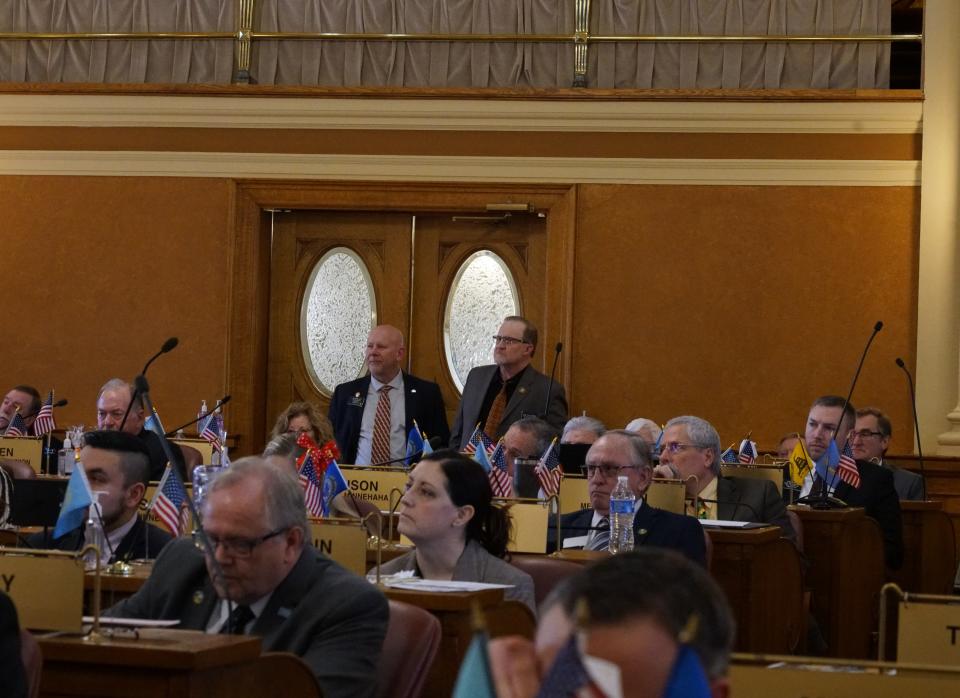Lawmakers vote to fundamentally change how South Dakota handles parole for violent offenders
PIERRE — House lawmakers voted 53-17 on Tuesday to approve a bill that would fundamentally change how South Dakota sentences people with violent crime convictions.
SB 146, known as the Truth in Sentencing bill, was sponsored by Sen. Brent Hoffman, R-Sioux Falls. Under the bill, sentencing guidelines for violent crimes would require those convicted to either serve their full sentence or 85% of their sentence.
"Surely, you've heard the calls from our citizens to do something about crime, especially violent crime," Rep. Sue Peterson, R-Sioux Falls, said.
More:'Truth in Sentencing' bill that would alter sentencing for violent offenders advances to House floor
In the first section of the bill, anyone convicted of one of 13 high level violent crimes, such as first-degree manslaughter and first-degree human trafficking, would have to serve the full sentence imposed on them by a judge without credits for a shortened term. The offender would then be eligible for supervised release.
In the second section, those convicted of one of 10 other violent crimes, such as aggravated assault or second-degree manslaughter, could receive credits that could be applied toward shortening their sentence. However, they must serve at least 85% of their sentence before becoming parole eligible.
Attorney General Marty Jackley, who has supported the bill in its various committees, said in a House Judiciary committee on Feb. 22, the bill was the first step toward what happened on the federal level years ago, when the feds did away with the parole system. He added the bill gave discretion to the courts and the Board of Parole and Pardons, when it came to supervised release.

While House members debated the merit of changing the sentencing system, including a rise in the number of police shootings across the state, opponents argued the bill removed parole and incentive opportunities, and that more resources needed to be dedicated to policing, prison programming and parole.
Rep. Tim Reisch, R-Howard, brought an amendment to remove the two sections detailing the type of crime and instead elevate the time served by 20%. All inmates convicted of violent crime would also have the opportunity for parole. The amendment failed.
"The reality is that if this bill passes, even more crimes are likely to occur, because inmates will release from prison without supervision, without having to take random drug tests, and without being required to attend AA or other community based programs," said Reisch, a former Corrections Secretary. "They'll be unencumbered by that pesky parole agent and for the most part, free to do whatever they want to."
More:House approves multi-million-dollar projects for new men and women state prisons
Rep. Will Mortenson, R-Pierre, House Majority Leader, supported the amendment, but not the original bill. He said it was difficult to reconcile what he heard from law enforcement and data showing that overall crime rates are down.
"I know that what they're telling me is true in their lived experience, but it's not true in the numbers statewide," Mortenson said, adding that he believes parts of Sioux Falls have become more violent.
Opponents also argued that the bill would cause more people to be put in prison. The House voted Monday to approve construction of a new women's prison in Rapid City and the purchase of land for a new men's prison in Sioux Falls.
Rep. Mike Stevens, R-Yankton, argued judges would be turned into robots when determining sentences for violent offenders.
"This bill will not change a single thing, but cost the taxpayers more money and reduce the number of people who are going to get help to be rehabilitated," he said.
More:South Dakota lawmakers want to tighten how the state handles parole eligibility
Moments after SB 146 was passed, the ACLU issued a statement on the vote. They called the bill a "one-size fits all" approach.
"If we want to improve public safety, we need to increase investment in rehabilitation and re-entry, not incarceration," said Samantha Chapman, the ACLU of South Dakota advocacy manager. "By eliminating the possibility of parole for entire groups of people who are incarcerated, there is no motivation for self-evaluation and genuine desire for change.”
SB 146 now heads back to the Senate for the body to approve minor amendments made in the House Judiciary committee regarding dates. Once approved by the Senate, the bill will go to Gov. Kristi Noem's desk for her signature. If signed into law, the bill will impact crimes committed after July 1.
This article originally appeared on Sioux Falls Argus Leader: SD votes to fundamentally change sentencing guidelines for violent crime

